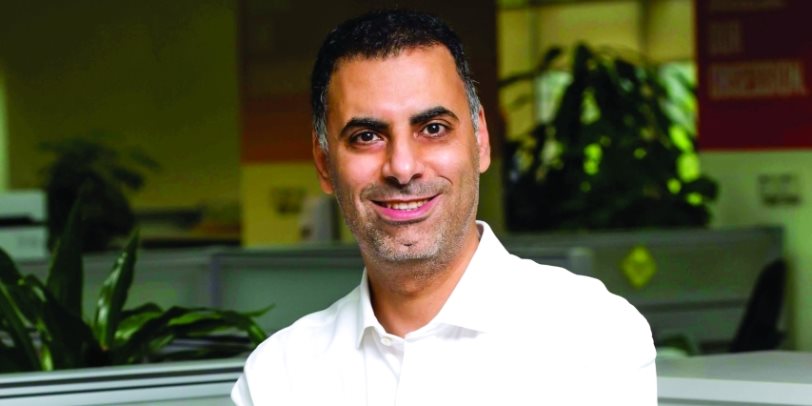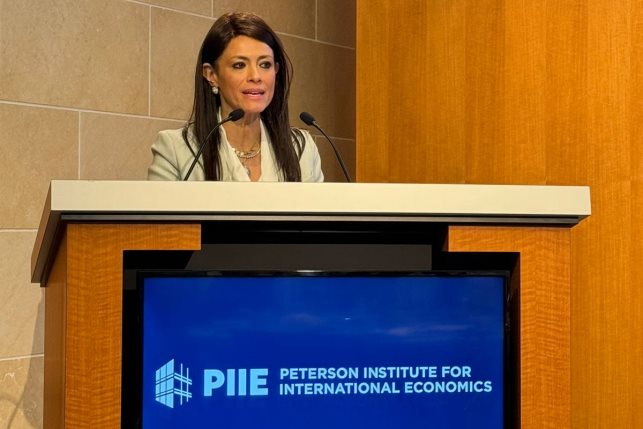Intel’s role in promoting sustainability, green technologies
Business Today Egypt interviewed Ahmed Ibrahim, Director, Global Business Development – Service Providers at Intel Corporation.
 Renewable energy plants
Renewable energy plants
Climate change is the greatest challenge the world has ever faced. The Conference of the Parties of the UNFCCC (COP27) raised a question about the role of the technology industry and its role in supporting climate change.
During the Cop27, Business Today Egypt interviewed Ahmed Ibrahim, Director, Global Business Development – Service Providers at Intel Corporation as one of the world's leading semiconductor design and manufacturing companies which is playing a vital role in fighting climate change and supporting the whole eco-system by developing more sustainable technology solutions.

Q. How is Intel addressing global climate change?
A. Climate change is a serious environmental, economic, and social challenge. We focus on reducing our own climate impact—the emissions resulting from our own operations, our supply chain, and the marketing and use of our products. We also work to identify ways that Intel technology can help others reduce their climate impacts.
Building upon our 2030 RISE strategy and extending our long-standing commitment to leadership in sustainability to include suppliers, customers, and products toward a net-zero computing future, Intel announced plans to achieve net-zero greenhouse gas emissions in its global operations by 2040, to drive supplier greenhouse gas emissions reductions, to increase the energy efficiency and lower the total carbon footprint of Intel products and platforms, and to work with customers and industry partners to create solutions that lower the footprint of the entire technology ecosystem.
As one of the world’s leading semiconductor design and manufacturing companies, Intel is uniquely positioned to drive global sustainability and greenhouse gas reduction, both through its own actions and by empowering its customers and other innovators.
Our commitment to corporate responsibility and sustainability - built on a strong foundation of transparency, governance, and ethics - creates value for Intel, our investors, our customers and other stakeholders and helps us mitigate risks, reduce costs, build brand value, and identify new market opportunities. Intel continuously looks for ways to improve its business, as well as to collaborate with other organizations to advance best practices in corporate responsibility worldwide.
Our vision for sustainable data centers takes a holistic view of data centers from the edge to the cloud. This puts the network in-between, which is often as big or a larger source of carbon than just the servers used for compute, and needs to be accounted for in making sustainable decisions on where to place workloads.
From there our vision is to drive continuous innovation around Sustainable Semiconductor Manufacturing. This includes driving to net zero carbon consumption in product manufacturing, Using renewable electricity sources to power our manufacturing sites, driving to water positive factory usage where we’re replenishing more water than we use, and contributing zero waste to landfills.
Sustainable Manufacturing then leads to Sustainable Products. We look at the entire system architecture to drive our sustainable products strategy – data center to rack to platform to silicon – and then design our products to enable optimizing for sustainability throughout the system. A key innovation in this area is creating modular servers where data center operators can upgrade computers, network, and I/O. This both optimizes performance as well extends the life of products resulting in less eWaste.
We then partner with the broader compute industry to drive a Sustainable Ecosystem. Our first goal here is to converge the computer industry to a standardized carbon measurement. This gives the industry a common methodology to measure and track carbon that enables Intel and the ecosystem to reduce carbon throughout the supply chain.
Q. What are some of the key sustainable technology innovations to watch out for?
A. New technologies are rapidly transforming all aspects of our economy, society and environment. Today, governments and businesses are leveraging advanced technologies to introduce new business models, promote sustainability, and improve the general standard of living for today’s global citizens. IoT, AI, machine learning, blockchain technology, 5G, robotics, and cloud computing are several technologies that are being leveraged in solutions to achieve these goals. These technologies connect citizens around the world, monitor and track environmental impact, and optimize industrial inefficiencies. Ultimately, they are transforming traditionally wasteful practices into sustainable and efficient means of operation.
There are several areas to invest for development towards greener communities;
• Renewable energy technologies / Green technologies
o Wind and Solar technologies
• Electric and Automated Vehicles
o Efficiency in Energy Companies
o Public Electric transport
o Smarter management of complex systems
o Automation and Data analytics
• Blockchain, digital currencies
• Smart Cities
o Smart Power Meters and kill switches
o Smart Grids (intelligent grid management)
o Waste-to-energy Plants
o Integrated Transport and Logistics systems (to reduce need for private vehicles)
• Information and communications technology
• Aerospace
• Semiconductors
• Metals and mining
Q. Which emerging technologies will have the maximum impact on sustainability goals?
A. Emerging technologies can help communities not only grow their economies but also tackle larger social and environmental issues.
Intel announced two new investments in its continuing efforts to create more sustainable data center technology solutions. First, Intel unveiled plans to invest more than $700 million for a 200,000-square-foot, state-of-the art research and development mega lab focused on innovative data center technologies and addressing areas such as heating, cooling and water usage. Additionally, Intel introduced the technology industry’s first open intellectual property (open IP) immersion liquid cooling solution and reference design. With the initial design proof of concept initiated in Taiwan, Intel aims to simplify and accelerate the implementation of immersion liquid cooling solutions throughout the ecosystem globally.
The new mega lab will be focused on areas such as immersion cooling, water usage effectiveness and heat recapture and reuse. Construction on the lab will begin this year at the Jones Farm campus in Hillsboro, Oregon, with opening expected in late 2023. Additionally, the lab will qualify, test and enable Intel’s portfolio of data center products including Intel®️ Xeon®️, Intel®️ Optane™️, network interfaces and switch gear, Intel®️ Agilex™️ FPGAs, Xe architecture, and future products under development. The lab will also host an advanced technology showcase for customers and partners to observe and test Intel products in a variety of data center environments in the lab, in an effort to accelerate adoption of these new technologies throughout the ecosystem.
The industry’s first open IP data center immersion liquid cooling solution and reference design is an open, easy-to-deploy and easily scalable total cooling solution. It will allow partners to accelerate the introduction of Intel solutions in response to the trend of increasing data center power density to enhance operational efficiency. The initial solution and design proof of concept will be completed in partnership with Intel Taiwan and across the Taiwanese ecosystem in a phased approach, with plans to scale out globally. Intel will continue to work with partners to develop and validate related solutions.
Why It Matters: Data centers represent approximately 1% of the global electricity demand and account for about 0.3% of global carbon emissions. Investing in standardizing cooling technologies and R&D for future innovations strengthens Intel’s commitment to more sustainable technology solutions. Research shows that immersion cooling with energy reuse could reduce carbon emissions by 45% compared to traditional data center usage.
For those of you operating your own data center, you can follow Intel’s best practices to reduce operational carbon footprint by taking a holistic view of your operations. For those of your who don’t operate a data center, this is the formula we use to ensure cloud service provider are optimizing for sustainability when using our products. At the data center level, operators need to optimize for the lowest PUE. We see that the average reported PUE is around 1.59. Intel own data centers and the most efficient data center in the world, operate at a PUE of less than 1.10.
You can get to these levels by implementing new cooling techniques such as liquid immersion cooling and by using AI based telemetry across the data center to intelligently reduce power consumption. Intel Xeon processors and platforms have a vast number of telemetry controls that enable operators to fine tune energy consumption.
Finally, we focus on maximizing utilization. Hardware performance has outpaced software’s ability to take advantage of it. We work with software ecosystem partners to maximize the usage of the underlying silicon.
.jpeg)
Q. How can organizations in the Middle East benefit from green technologies?
A. Most economies in the Middle East depend on fossil fuels to fund their budgets and support economic activities. The Arab Gulf Cooperation Council (GCC) have historically been particularly dependent on oil as the main contributor to their GDP and oil exports make up > 75% of most GCC countries exports. There is a transformation in progress to move away from oil dependent economies to knowledge and technology based economies where data will play a key role in this transformation. Intel believes that Data is going to be, and is already becoming, the “new oil” - a crucial source of wealth for these nations. A concrete example of this process could be autonomous driving: already in the near future, autonomous cars will run on data in the same way that today’s cars run on gasoline.
Data is already defining the future of this region, of industry, and of Intel as a company: it is at the core of the digital transformation and represents an opportunity to simplify and streamline how companies operate. Governments in the GCC are increasingly aware of the urgency of shifting towards knowledge-based economies and diversifying beyond oil, especially considering the global call to shift to alternative energy sources. Technology is the common thread that runs through all of these initiatives. It is at the center of a new vision of the future, one that includes mega projects planned with greater focus on modern and smart infrastructure buildout focused on smart cities, smart transportation projects, and mega events.
Intel aims to accompany and further this shift “from oil to data” by supporting the new vision of the future as GCC governments embark on strategic long-term national initiatives. Intel’s goal is to power the solutions and innovations generated by the key ecosystem players in the region as a technology leader in many sought after fields like AI, Video Analytics, etc. Intel wants to deliver the technology solutions that enable governments and companies to successfully reach their goals. Intel solutions help customers stay ahead of their growing infrastructure demands by offering scale, innovation, and expertise from the edge to the cloud and back.
Intel is launching PROJECT MUSTAKBAL (in Arabic Mustakbal means Future) with the objective of bringing the Intel advantage to the Middle East, supporting the governments and ecosystems in the region as they harness the world of data and diversify their economies beyond oil dependency. Intel has already mobilized resources to execute its PROJECT MUSTAKBAL strategy. This includes pulling technical, sales and marketing resources; repurposing the Intel Innovation Hub in Dubai to focus on use cases related to the project; and creating partnership with key ecosystem players.
Besides, Intel has expanded its product offerings to provide end-to-end solutions, scaling from edge computing to the network, the cloud, and the emerging field of AI and autonomous driving.
Looking towards the future, the PROJECT MUSTAKBAL team is currently working on identifying the key use cases sought after by customers in the region to match them with the right Intel technologies and experts. Intel will engage with its partners to identify the data-centric, AI and IOT projects they are engaged with so as to match them with Intel resources and help expedite these very projects.




